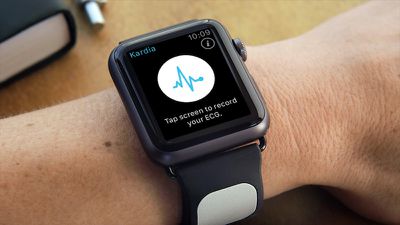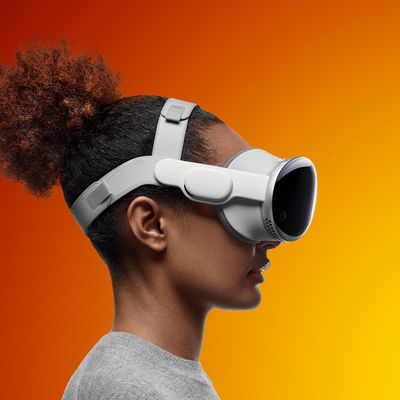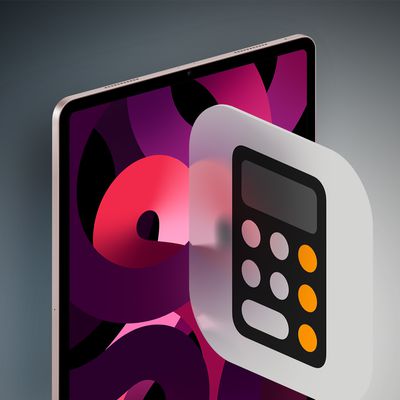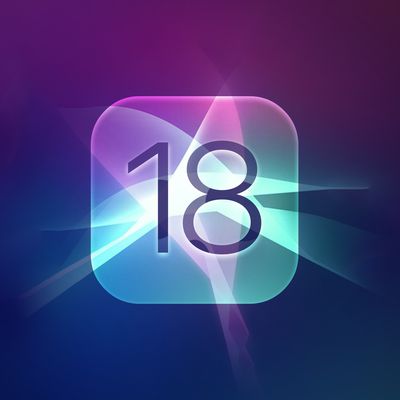Medical smartphone accessory company AliveCor this week received FDA-approval for its EKG Kardia Band, the first medical-grade accessory for Apple Watch. The band has been available in Europe for some months, but the product's clearance by the FDA means it can now be sold in the United States.
The Kardia Band for Apple Watch has an integrated metallic sensor in the strap that enables it to communicate with the company's app to take EKG readings, where it can detect abnormal heart rhythm and atrial fibrillation (AF), much like AliveCor's existing KardiaMobile device.

However, the latter device attaches to the back of an iPhone and requires users to hold their phone with both hands for 30 seconds to register a reading, whereas the Kardia Band lets wearers take readings discreetly wherever they are and in real time.
Users need only navigate to the Apple Watch-compatible Kardia app, start a reading, place their thumb on the sensor, and wait for the 30-second analysis to finish. During this time, they can also speak into the Apple Watch's microphone to note the presence of palpitations or shortness of breath, or any dietary habits that could be linked to heart-rate fluctuations.
Recordings are stored and viewed in the Kardia iPhone app, and can also be sent to the user's doctor. The app also connects to Apple's stock Health app, so users can integrate their EKG readings into other fitness data for a more comprehensive picture of their overall health.
According to TechCrunch, AliveCor is also introducing a new feature called SmartRhythm that utilizes a neural network for better insights into heart rate data. The company says SmartRhythm can potentially detect an abnormal heart beat using the Kardiaband or KardiaMobile EKG reader.
The AliveCor Kardia Band costs $199 and can be ordered directly from the company's website or from Amazon. Readers should also note that a subscription to AliveCor's premium service ($99 a year) is required to access all of the available features once the 30-day trial period ends.
(Thanks, Anna!)


















Top Rated Comments
I've heard of people who were denied health coverage because of the DNA sequencing they ordered and failed to realize that they didn't own that data.
We need to push for digital privacy laws like yesterday.
[doublepost=1512064375][/doublepost]MB Hockey is right. It's a single-lead ECG, so it's limited in what it can diagnose (it _won't_ detect or predict an impending MI, which you need a full 12-lead ECG for), but the Alivecor is effective in diagnosing AF and monitoring heart rate and rhythm. In particular, it lets you distinguish between a few irregular beats and a persistent AF, and that "little knowledge" can be a pretty good thing. The main risk from AF is stroke, not a heart attack, and there are people who have chronic AF and live with it because they're not good candidates for cardiac ablation or other definitive treatments. What they do have to do is stay on an anticoagulant so blood clots won't form in the heart and travel to the lungs or brain.
I've had three AF episodes in the last two years, and the last one happened during a hockey game (I'm a ref). I did a check between periods, found I was in AF, knew I was otherwise OK, finished the game, and started my medication and called my cardiologist as soon as I got back to the dressing room. The other benefit of using the Alivecor is to check rhythm and verify that it's normal if something feels unusual (like the heart rate being low). It saved a couple of calls/visits to the doctor.
This is a first step into getting better information.
I'm a T1 diabetic, and when I was a kid, we used urine tests to test our blood sugar (huh?), as it was an indicator that your kidneys were filtering out the sugar, and putting it in your urine. Blood sugars were done at the doctor's office every 6 months, or at home with a strip you put blood on, waited a minute, wiped the blood off, and then matched it to a color code on the side of the canister, and it had a +/- 30% rating, and a huge person to person variability.
Then came the electronic testers, and the test was to put a drop of blood on a strip held in the tester (that cost $500 in 1979 dollars, about $1700 today), and it was an optical read of the color of the strip, and it was moderately accurate (+/- 20%, and for some diabetics, having an actual blood sugar of 60 vs. 72 (edge of tolerance) is a huge thing, but I digress).
Today, there are electronic testers at Walmart that are accurate to within 10%, and they are about $20, and the test strips are 80 cents each, and they are in the "a little knowledge" category that you detail, as there are better ways, which is the continuous glucose monitor, which tests blood glucose to within 5%, do a reading every 5 minutes, and let you know when things are going bad.
Like I said, this is a step in the road to better health.